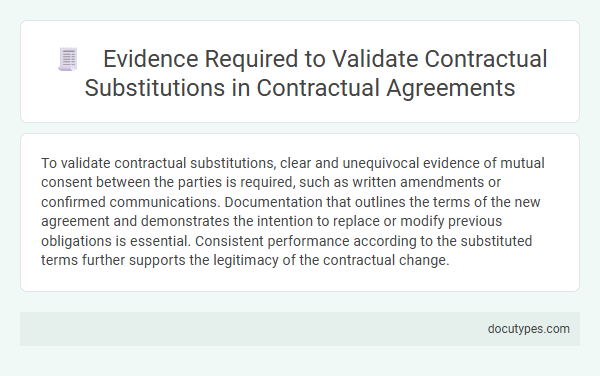To validate contractual substitutions, clear and unequivocal evidence of mutual consent between the parties is required, such as written amendments or confirmed communications. Documentation that outlines the terms of the new agreement and demonstrates the intention to replace or modify previous obligations is essential. Consistent performance according to the substituted terms further supports the legitimacy of the contractual change.
Introduction to Contractual Substitutions
Contractual substitutions require clear and convincing evidence to ensure all parties agree to the changes. Understanding the basics of these substitutions is crucial for validating amendments within a contract framework.
- Written Amendments - Documented changes signed by all involved parties serve as primary proof of substitution.
- Consistent Communication - Emails, letters, or recorded conversations that demonstrate mutual agreement support the validity of substitutions.
- Performance Evidence - Actions taken in accordance with the substituted terms provide practical confirmation of contract modification.
You must gather relevant and reliable evidence to uphold the integrity of contractual substitutions during disputes or reviews.
Legal Foundations for Contractual Substitutions
Legal foundations for contractual substitutions require clear evidence demonstrating the parties' mutual consent to amend or replace original contract terms. Documentation such as written agreements, signed amendments, or recorded communications substantiates the intention to substitute contractual obligations. Courts often rely on consistent performance history and explicit proof of agreement to validate contractual substitutions.
Importance of Evidentiary Support in Contract Substitutions
Evidentiary support is crucial in validating contractual substitutions to ensure all parties clearly understand and agree to the changes. Documentation such as written amendments, signed agreements, and correspondence provides verifiable proof of consent and terms. Without solid evidence, disputes arise, risking contract enforceability and legal complications.
Types of Evidence Recognized in Contract Law
What evidence is needed to validate contractual substitutions? Valid contractual substitutions require clear proof demonstrating mutual consent between the parties involved. Types of evidence recognized in contract law include written documents, oral agreements, and conduct indicating acceptance.
Documentation Standards for Substitution Validation
Validating contractual substitutions requires robust documentation that clearly outlines the changes and their justifications. Essential evidence includes signed amendments, detailed comparison reports, and communication records between parties.
Documentation standards emphasize accuracy, traceability, and timely updates to maintain contract integrity. You must ensure all substitution documents comply with regulatory requirements and include relevant approvals and timestamps.
Role of Written Agreements and Amendments
| Aspect | Details |
|---|---|
| Written Agreements | Written agreements serve as the primary evidence required to validate contractual substitutions. They clearly document the consent of all parties involved and define the terms of substitution. A well-drafted written contract minimizes disputes regarding substitutions. |
| Amendments | Amendments to the original contract provide critical proof when contractual terms change. These must be signed by all relevant parties to ensure legal enforceability. Properly executed amendments reflect the intention to substitute specific clauses or obligations. |
| Supporting Documentation | Correspondence such as emails, memos, or meeting minutes can supplement written agreements and amendments. This documentation supports the negotiation process and corroborates the substitution's validity. |
| Role of Your Signature | Your signature on written agreements and amendments establishes acceptance and recognition of the substitutions, making these documents legally binding and effective evidence. |
| Legal Standards | Contracts and their substitutions must comply with applicable contract law standards, including clarity, mutual consent, and consideration, to be considered valid. |
Witness Testimony and Affidavits as Proof
Validating contractual substitutions requires clear and credible evidence to demonstrate mutual agreement and intent. Witness testimony and affidavits play a crucial role in establishing the authenticity of such changes.
- Witness Testimony - Eyewitness accounts confirm the discussions and consent related to contract substitutions.
- Affidavits - Sworn statements provide formal, written proof supporting the legitimacy of substituted terms.
- Corroboration - Both forms of evidence strengthen your position by offering consistent and reliable documentation of the contract modification process.
Electronic Records and Digital Signatures in Substitutions
Validating contractual substitutions requires clear evidence demonstrating mutual consent and the specific terms of the new agreement. Electronic records serve as reliable documentation by capturing the precise content and timestamp of the substitution.
Digital signatures authenticate the identities of the parties involved and ensure the integrity of the substituted contract. These signatures comply with legal standards, providing verifiable proof that the substitution was authorized and intentional.
Common Challenges in Proving Contractual Substitutions
Validating contractual substitutions requires clear and convincing evidence demonstrating the parties' intent to alter the original agreement. Common challenges include ambiguous documentation, lack of mutual consent, and inconsistent performance.
- Ambiguous Documentation - Vague or incomplete records often make it difficult to prove the existence of a valid substitution.
- Lack of Mutual Consent - Without clear agreement from all parties, demonstrating that a substitution was authorized becomes a significant hurdle.
- Inconsistent Performance - Differing actions by the parties under the substituted contract may contradict the alleged changes, complicating validation.
What Evidence Is Needed to Validate Contractual Substitutions? Infographic

